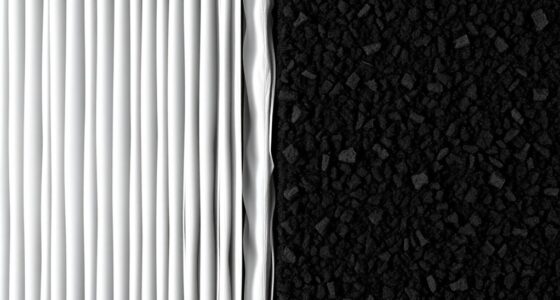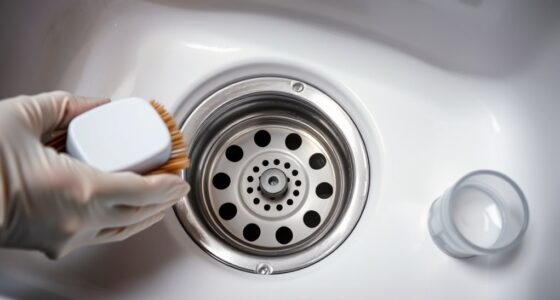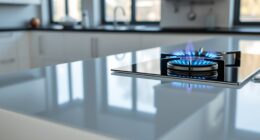In our homes, we depend on our kitchen appliances to assist us in making delicious meals. However, if we do not take care of and maintain these appliances properly, they can end up causing more headaches than helping us in the kitchen.
That’s why we must implement effective preventive maintenance strategies to keep our kitchen appliances in top-notch condition. By following a cleaning and maintenance schedule, checking for wear and tear, and regularly inspecting electrical components, we can ensure their longevity and optimal performance.
Additionally, proper ventilation and airflow, lubricating moving parts, and inspecting and cleaning seals and gaskets are essential steps in preventing breakdowns. We must also pay attention to the exterior surfaces and address minor repairs promptly.
And for those complex tasks, professional maintenance and tune-ups will help us achieve mastery over our kitchen appliances.
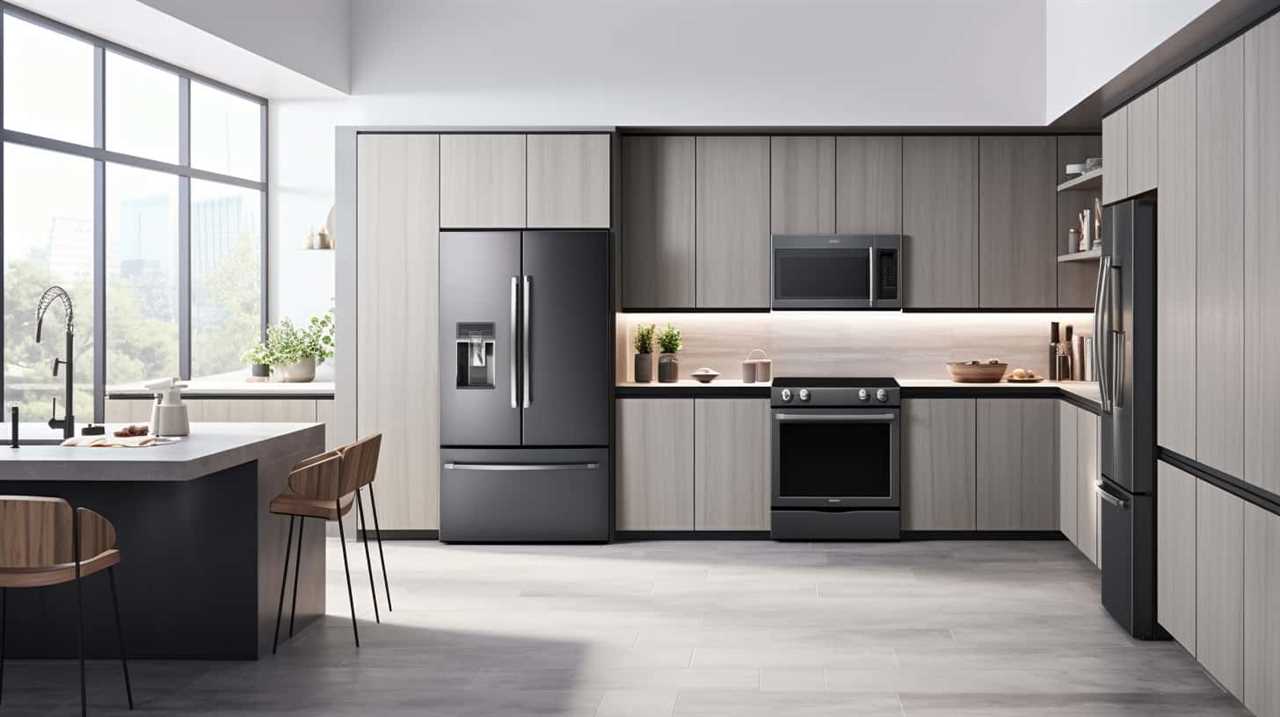
Key Takeaways
- Establishing a routine for cleaning kitchen appliances, including daily wipe-downs and regular deep cleanings, is essential for maintaining their efficiency and functionality.
- Regular inspections help identify and address potential issues early on, preventing costly repairs and extending the lifespan of appliances.
- Proper ventilation and airflow are crucial for preventing blockages, maintaining a healthy indoor environment, and improving appliance performance and energy efficiency.
- Regular lubrication and temperature calibration ensure smooth operation, increased efficiency, and extended appliance lifespan, while clearing and descaling water lines prevent clogs, reduced water flow, and damage to appliances.
Cleaning and Maintenance Schedule
We create a regular cleaning and maintenance schedule to ensure the optimal performance and longevity of our kitchen appliances. By implementing effective maintenance methods and utilizing proper cleaning techniques, we can prevent the build-up of dirt, grease, and debris that can negatively impact the functionality of our appliances.
To begin, it’s essential to establish a routine for cleaning our kitchen appliances. This includes daily wipe-downs to remove any spills or splatters, as well as regular deep cleanings to eliminate stubborn stains and grime. We also prioritize cleaning the filters, coils, and vents, as these areas tend to accumulate dirt and dust over time. By incorporating these cleaning tasks into our schedule, we can maintain the efficiency and functionality of our appliances.
In addition to cleaning, proper maintenance techniques are crucial for the longevity of our kitchen appliances. This involves inspecting and tightening any loose connections, checking for leaks or damages, and lubricating moving parts as necessary. Regularly cleaning and replacing filters, such as those in our dishwasher or range hood, is also vital to ensure optimal performance.
Checking for Wear and Tear
To ensure the optimal performance and longevity of our kitchen appliances, it is crucial for us to regularly check for signs of wear and tear. By identifying and addressing potential issues early on, we can prevent costly repairs and extend the lifespan of our appliances. To help you with wear and tear prevention, here is a maintenance checklist that you can follow:
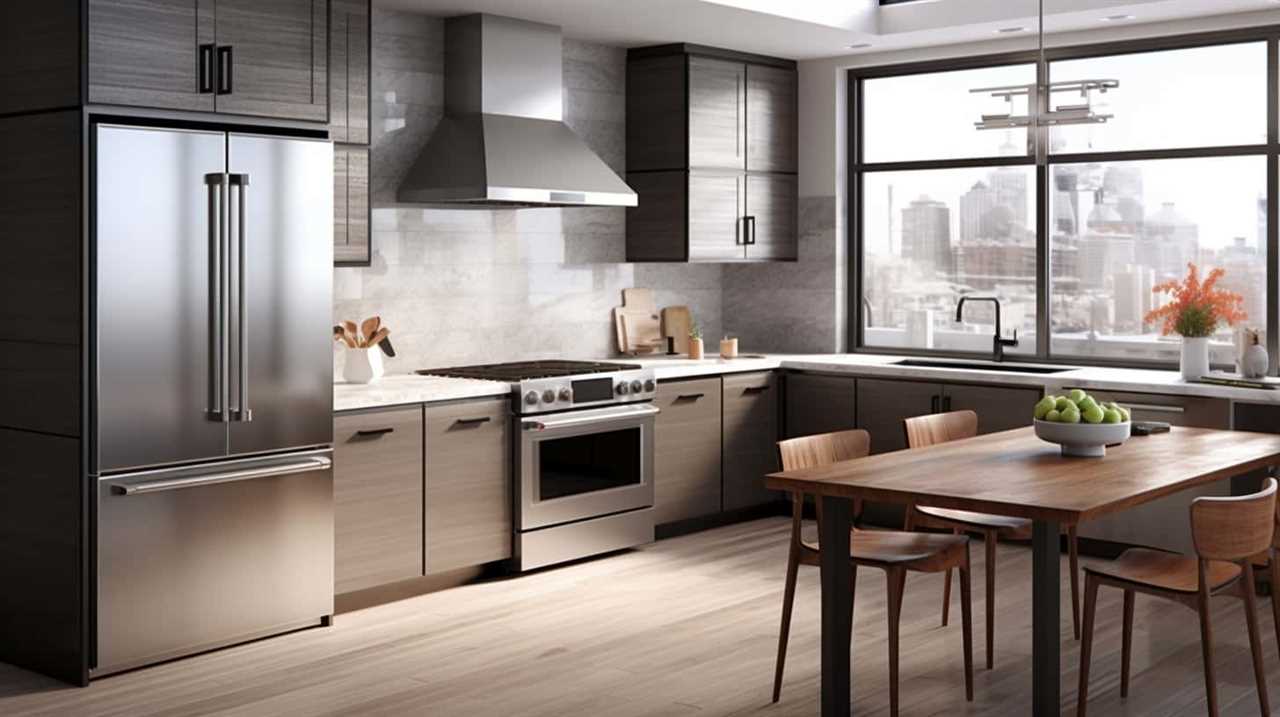
| Appliance | Signs of Wear and Tear | Preventive Measures |
|---|---|---|
| Refrigerator | Cracked or damaged seals, excessive condensation | Clean and inspect door seals regularly, replace if necessary |
| Oven | Uneven cooking, inconsistent temperature | Calibrate oven temperature, clean and inspect heating elements |
| Dishwasher | Leaking water, clogged spray arms | Check for leaks and replace damaged hoses, clean and unclog spray arms |
| Microwave | Sparks or arcing, uneven heating | Inspect interior for damaged or chipped surfaces, replace faulty parts |
| Coffee Maker | Slow brewing, weak coffee | Descale regularly, clean and replace filters |
By incorporating these simple checks into our maintenance routine, we can prevent wear and tear from compromising the performance of our kitchen appliances. Regular inspection and maintenance will not only ensure the longevity of our appliances but also guarantee our safety in the kitchen.
Now that we have discussed the importance of checking for wear and tear, let’s move on to the next section about regular inspection of electrical components.
Regular Inspection of Electrical Components
When it comes to maintaining kitchen appliances, regular inspection of electrical components is crucial.
Visual checks allow us to identify any potential problems early on, preventing costly breakdowns and ensuring the safety of our appliances.

Importance of Visual Checks
Regularly inspecting the electrical components is crucial for ensuring the effectiveness and safety of kitchen appliances. Visual checks allow us to identify any potential issues or signs of damage before they escalate into major problems. By conducting regular inspections, we can detect faulty wiring, loose connections, or worn-out components, which can lead to electrical malfunctions or even fires. Not only does this preventive measure help in avoiding costly repairs or replacements, but it also ensures the smooth operation and longevity of the appliances. Additionally, regular visual checks provide peace of mind, knowing that our kitchen appliances are in good working condition. To help you understand the importance of visual checks, here is a table summarizing the benefits of preventive measures:
| Benefits of Preventive Measures |
|---|
| Early detection of issues |
| Minimizes risk of accidents |
| Extends appliance lifespan |
Regular visual inspections play a vital role in maintaining the efficiency and safety of kitchen appliances. By being proactive in examining the electrical components, we can prevent potential hazards and ensure optimal performance.
Early Problem Identification
Regular inspection of electrical components allows us to proactively identify and address potential problems early on. By conducting regular maintenance checks, we can detect any signs of wear and tear, loose connections, or faulty wiring that may lead to electrical malfunctions or even fires.
Early problem detection is crucial in preventing costly repairs and ensuring the safety of kitchen appliances. To effectively identify issues, it’s essential to follow a comprehensive maintenance checklist that includes inspecting power cords, switches, fuses, and circuit breakers. Additionally, visually examining electrical components for signs of overheating or abnormal noises can provide further insights into potential problems.
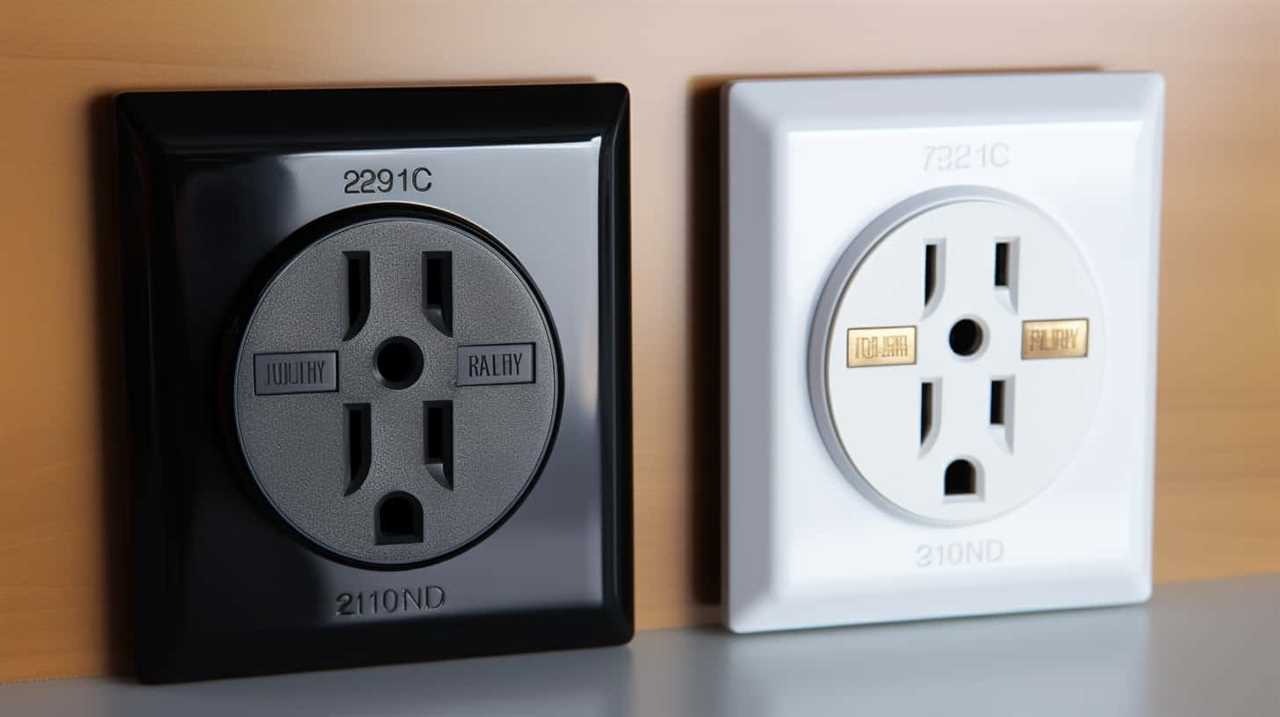
By incorporating these practices into our preventive maintenance routine, we can minimize the risk of electrical failures and extend the lifespan of our kitchen appliances.
Moving forward, let’s now explore another vital aspect of preventive maintenance: proper ventilation and airflow.
Proper Ventilation and Airflow
When it comes to proper ventilation and airflow in the kitchen, regular cleaning and maintenance are essential.
Ensuring that vents, exhaust fans, and filters are free from dirt, grease, and debris allows for optimal airflow and prevents potential blockages.
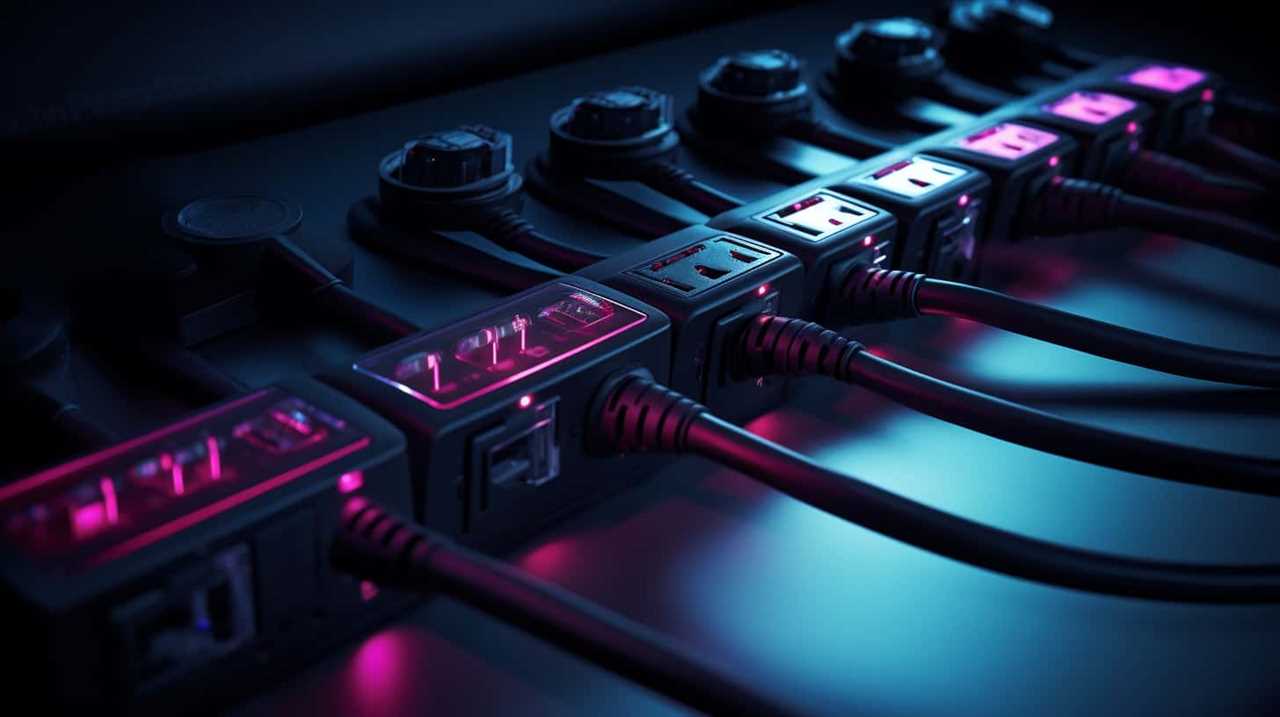
Additionally, understanding the importance of airflow in maintaining a healthy indoor environment and troubleshooting any issues with the ventilation system can help prevent costly repairs and ensure the longevity of kitchen appliances.
Regular Cleaning and Maintenance
To ensure optimal performance and longevity of kitchen appliances, it’s essential for us to prioritize regular cleaning and maintenance, specifically focusing on proper ventilation and airflow. Neglecting this aspect can lead to reduced efficiency, increased energy consumption, and even potential safety hazards.
Here are some cleaning techniques and maintenance tips to help you keep your kitchen appliances in top condition:
- Clean the exhaust hood and filters regularly to remove grease and prevent clogs.
- Vacuum the condenser coils behind the refrigerator to remove dust and debris that can hinder airflow.
- Check and clean the vents of your oven to ensure proper ventilation and prevent overheating.
Importance of Airflow
Ensuring optimal airflow is crucial for maintaining the efficiency and safety of kitchen appliances. Proper ventilation and airflow play a significant role in preventing the buildup of heat, smoke, and odors, which can affect the performance and lifespan of appliances. Regular maintenance, including cleaning and inspecting ventilation systems, is essential to ensure proper airflow. Neglecting this aspect can lead to various issues, such as reduced appliance efficiency, increased energy consumption, and potential safety hazards. By prioritizing the importance of proper airflow and incorporating regular maintenance practices, you can experience several benefits. These include improved appliance performance, enhanced energy efficiency, extended appliance lifespan, and a healthier indoor environment. The table below summarizes the key benefits of regular maintenance for optimal airflow.
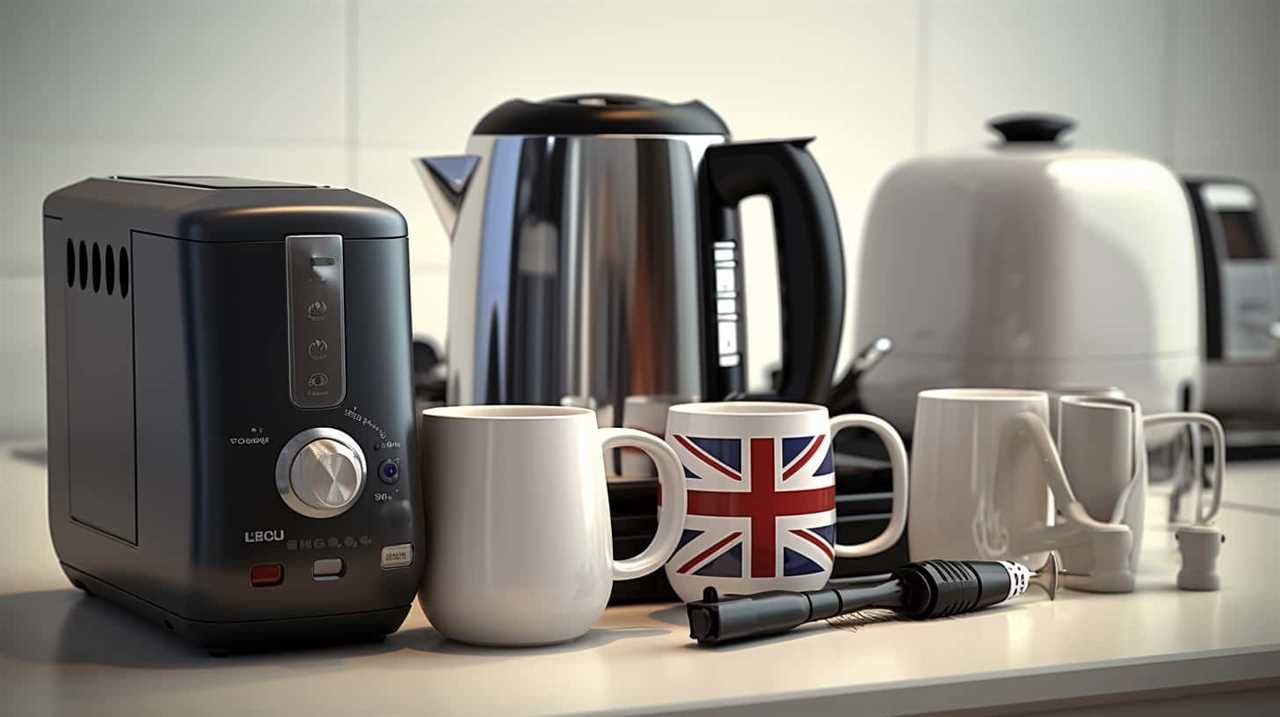
| Benefits of Regular Maintenance for Optimal Airflow |
|---|
| Improved appliance performance |
| Enhanced energy efficiency |
| Extended appliance lifespan |
| Healthier indoor environment |
| Reduced risk of safety hazards |
Ventilation System Troubleshooting
By regularly inspecting and cleaning the ventilation system, we can troubleshoot and ensure proper ventilation and airflow for kitchen appliances. Adequate ventilation is crucial in the kitchen to remove odors, smoke, and excess moisture, which can otherwise lead to poor indoor air quality and damage to appliances. Here are three troubleshooting techniques for maintaining an efficient ventilation system:
- Check for blockages: Inspect the ductwork and exhaust fans for any obstructions that may impede airflow. Remove any debris or buildup that could restrict the movement of air.
- Test the airflow: Use a smoke pencil or a tissue near the vents to assess the strength of the airflow. Weak airflow may indicate a clogged filter, a faulty motor, or an issue with the ductwork.
- Clean the filters: Dirty filters can hinder proper ventilation. Regularly clean or replace filters to ensure maximum airflow and prevent the buildup of grease and other contaminants.
These ventilation system maintenance and troubleshooting techniques will help ensure optimal performance and extend the lifespan of your kitchen appliances.
Lubricating Moving Parts
We regularly apply lubricants to the moving parts of our kitchen appliances to ensure smooth and efficient operation. Lubrication is a vital preventive maintenance technique that helps to reduce friction, wear, and tear on these components. By lubricating the moving parts, we can extend the lifespan of our appliances and minimize the risk of breakdowns.
There are several lubrication techniques that can be used for kitchen appliances. One common method is to apply a few drops of oil or grease to the hinges, gears, and other moving parts. It’s important to use the appropriate lubricant for each specific appliance to avoid damage or malfunction.

Regular lubrication offers several benefits. Firstly, it reduces friction between the moving parts, which helps to prevent excessive heat generation and wear. This can significantly extend the lifespan of the appliance. Secondly, lubrication ensures smooth operation, allowing the appliance to work more efficiently and quietly. Lastly, it can help to prevent rust and corrosion, especially in areas exposed to moisture or humidity.
To ensure effective preventive maintenance, it’s recommended to follow the manufacturer’s guidelines for lubrication frequency and type of lubricant. By incorporating regular lubrication into our maintenance routine, we can keep our kitchen appliances running smoothly and avoid costly repairs or replacements.
Testing and Calibrating Temperature Settings
After lubricating the moving parts, we proceed to test and calibrate the temperature settings of our kitchen appliances. This step ensures that our appliances are functioning at optimal levels and producing accurate and consistent temperatures.
To perform temperature calibration, we use specialized testing equipment designed for this purpose. Here are three important aspects of testing and calibrating temperature settings:
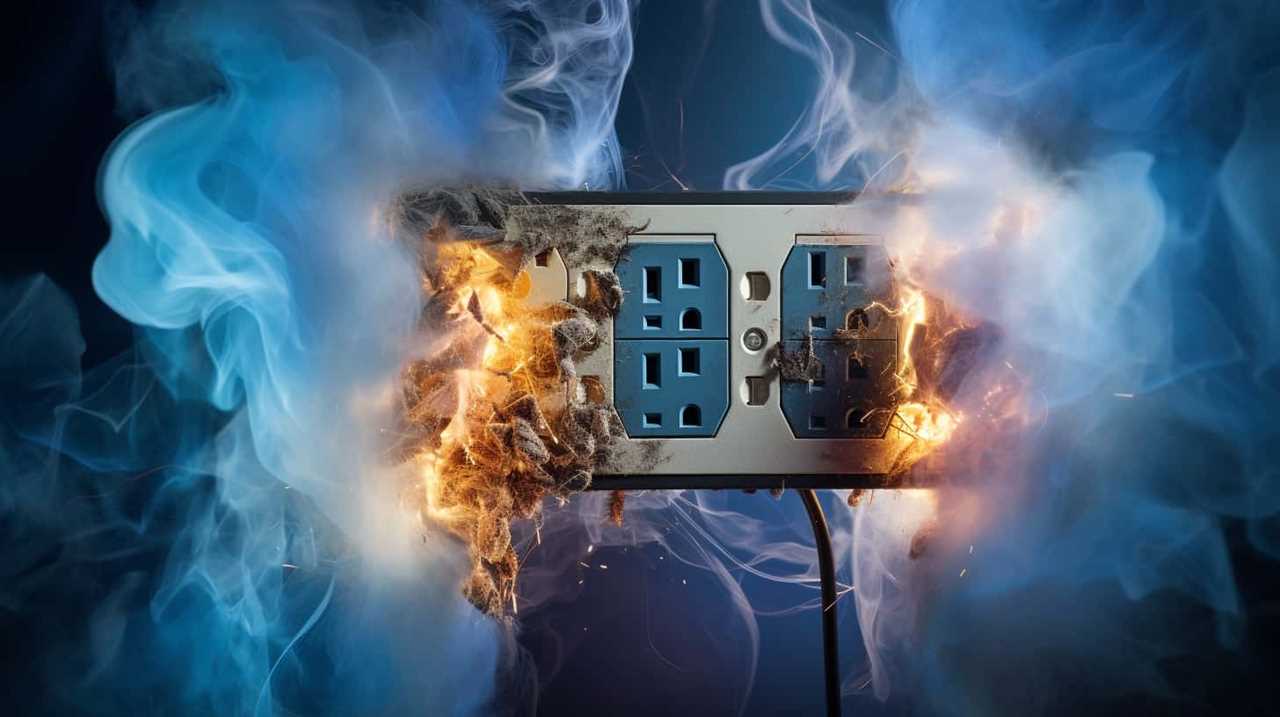
- Temperature Calibration Tools: We utilize digital thermometers with high accuracy to measure the temperatures produced by the appliances. These thermometers provide precise readings, allowing us to determine if the appliances are heating or cooling correctly.
- Verification of Temperature Accuracy: We compare the temperature readings displayed on the appliance’s control panel with those measured by the digital thermometers. This allows us to identify any discrepancies and adjust the temperature settings accordingly.
- Adjusting Temperature Settings: If the temperature readings aren’t accurate, we make the necessary adjustments to the appliance’s temperature settings. This ensures that the appliance maintains the desired temperature consistently.
Clearing and Descaling Water Lines
When it comes to kitchen appliance maintenance, it’s crucial to regularly clear and descale water lines. Neglecting this task can lead to clogs, reduced water flow, and even damage to the appliance.
Fortunately, there are several DIY descaling methods that can effectively remove mineral deposits and keep water lines clean and functioning properly.
Importance of Regular Maintenance
Regular maintenance of kitchen appliances is crucial in ensuring their optimal performance and longevity, as it allows for the effective clearing and descaling of water lines. By regularly maintaining your appliances, you can experience the following benefits:
- Enhanced performance: Regular maintenance helps to prevent clogs and buildup in the water lines, allowing for a smooth flow of water and ensuring that your appliances function at their best.
- Extended lifespan: Clearing and descaling water lines prevent the accumulation of mineral deposits, which can cause damage and decrease the lifespan of your appliances.
- Cost savings: By regularly maintaining your kitchen appliances, you can avoid costly repairs or replacements that may be necessary due to neglect.
Regular maintenance is an important preventive measure that ensures the proper functioning and longevity of your kitchen appliances.
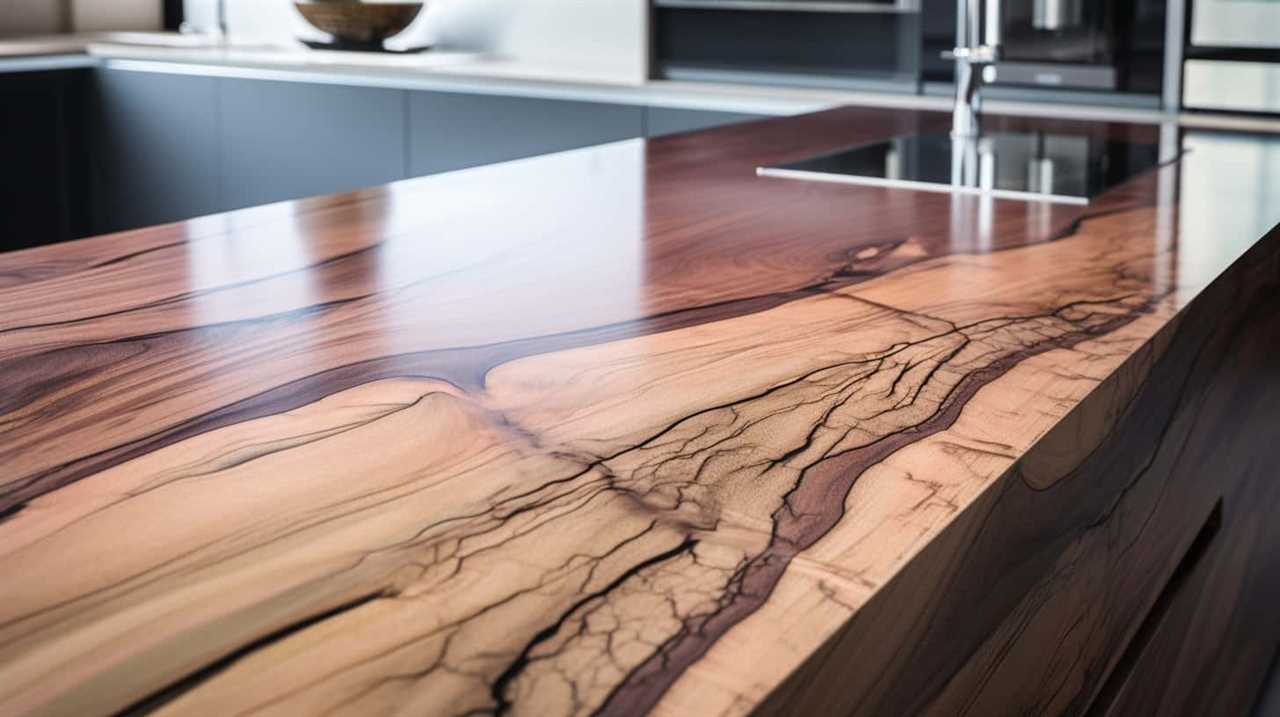
Now let’s explore some DIY descaling methods to help you keep your appliances in top condition.
DIY Descaling Methods
To effectively clear and descale water lines in kitchen appliances, we can use a simple and cost-effective DIY method.
There are various descaling methods that can be employed, depending on the severity of the buildup and the type of appliance.
One common method involves using a descaling solution made from equal parts water and white vinegar. This solution is poured into the water reservoir or water lines and left to sit for a period of time, usually around 30 minutes to an hour.
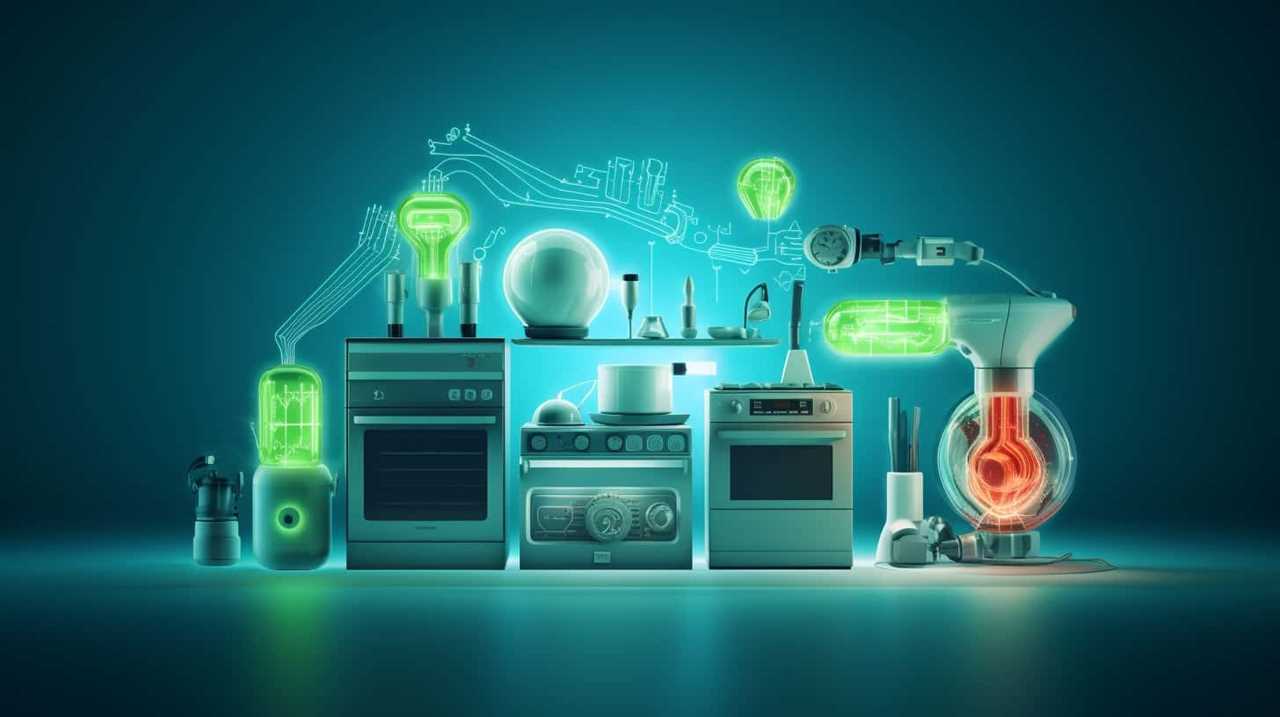
After the solution has had time to work, the appliance should be flushed with clean water to remove any remaining residue.
It’s important to follow the manufacturer’s instructions and safety guidelines when performing descaling procedures.
Regular descaling maintenance is essential to ensure optimal performance and prolong the lifespan of kitchen appliances.
Cleaning and Unclogging Filters
As part of our maintenance routine, we regularly clean and unclog filters to ensure the optimal functioning of kitchen appliances. Proper filter maintenance is crucial for maintaining the efficiency and longevity of these appliances.
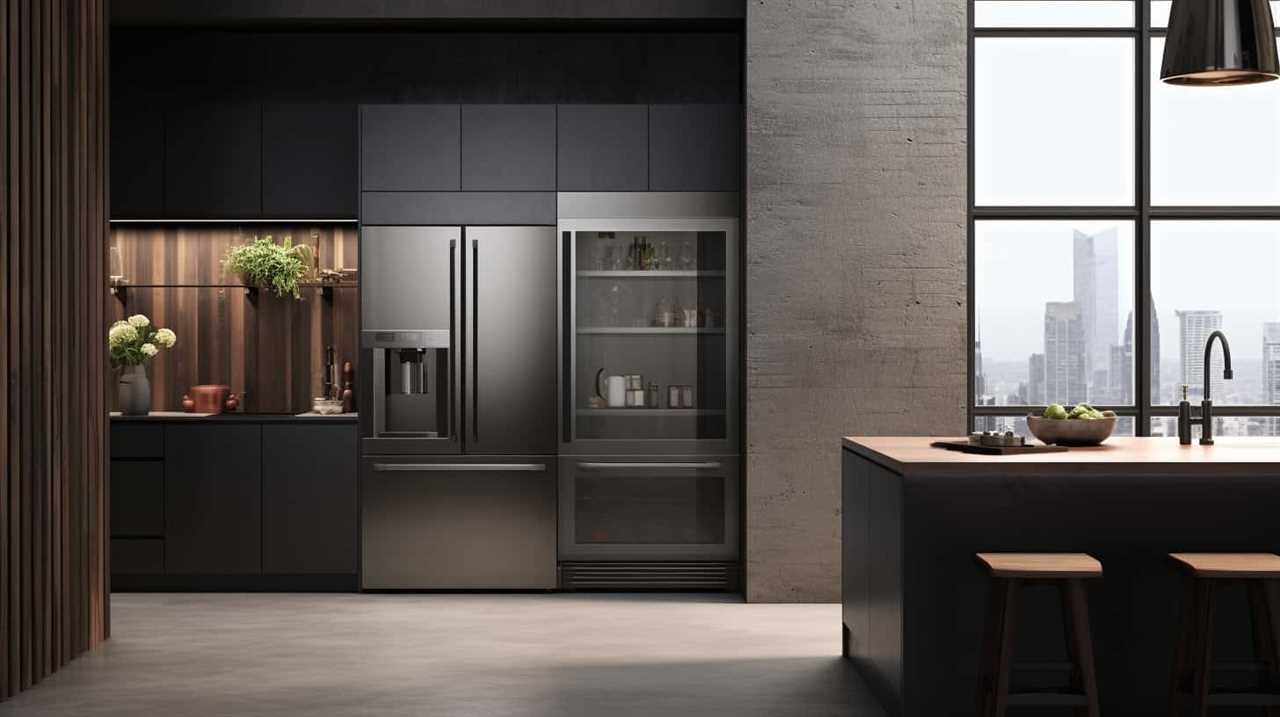
Here are some cleaning techniques and tips to help you keep your filters in top shape:
- Regular cleaning: It’s important to clean filters regularly to prevent the buildup of dirt, grease, and debris. Depending on the appliance, this may involve removing the filter and washing it with warm, soapy water or using a vacuum cleaner to remove any loose particles.
- Deep cleaning: In addition to regular cleaning, it’s recommended to deep clean filters at least once every few months. This involves soaking the filter in a mixture of warm water and a specialized cleaning solution to remove stubborn grease and grime.
- Unclogging: Filters can become clogged over time, which can hinder their performance. To unclog a filter, you can use a brush or a toothpick to gently remove any debris or buildup that’s causing the blockage.
Regularly cleaning and unclogging filters is essential for maintaining the efficiency and performance of kitchen appliances. By following these cleaning techniques, you can ensure that your filters continue to function optimally and extend the lifespan of your appliances.
Inspecting and Cleaning Seals and Gaskets
One important step in our preventive maintenance routine is regularly inspecting and cleaning the seals and gaskets of kitchen appliances. Seals and gaskets play a crucial role in maintaining the efficiency and functionality of appliances such as refrigerators, dishwashers, and ovens. A faulty or damaged seal can lead to energy loss, moisture leakage, or decreased performance. To ensure optimal performance and longevity of these appliances, it’s essential to inspect the seals and gaskets periodically.
During the seal inspection, carefully examine the condition of the seals and gaskets for any signs of wear, cracks, or deformation. Check for proper alignment and ensure that they’re securely attached to the appliance. If you notice any damage, it’s important to promptly replace the affected seals or gaskets to prevent further issues.
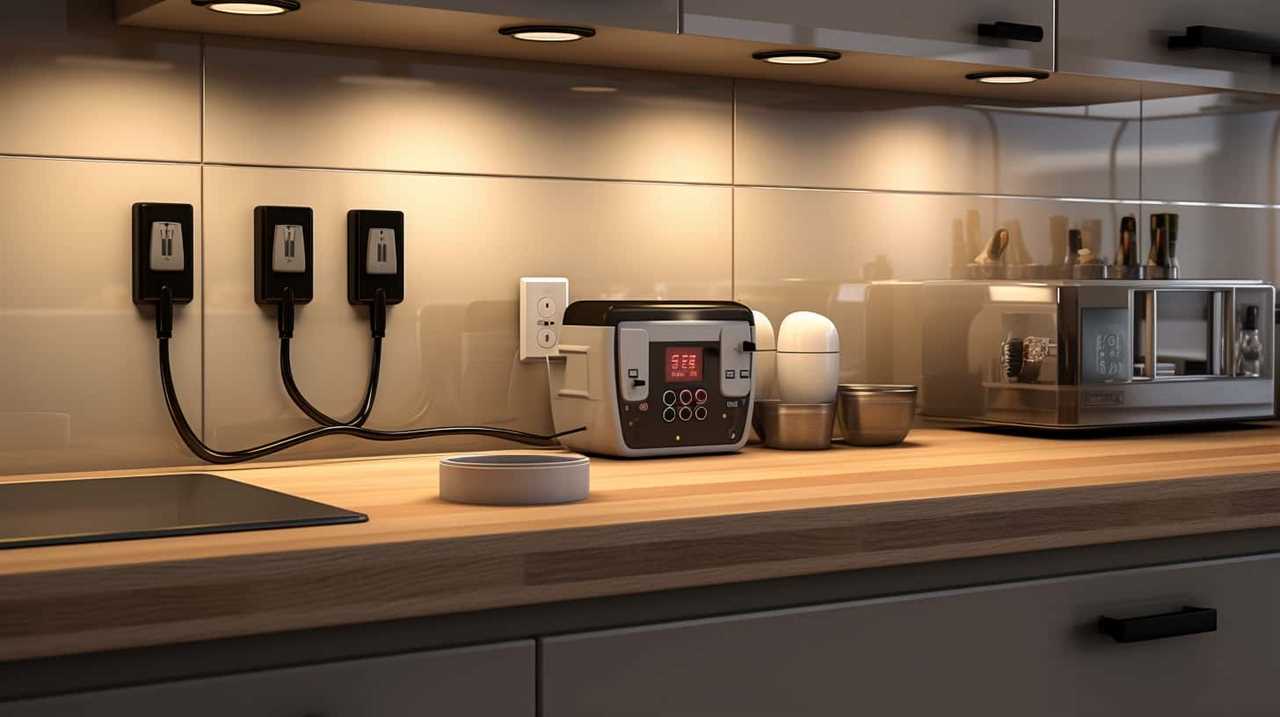
In addition to regular inspection, cleaning the seals and gaskets is equally important. Over time, these components can accumulate dirt, food particles, and grease, which can compromise their effectiveness. Use a mild detergent or a vinegar-water solution to gently clean the seals and gaskets. Avoid using abrasive cleaners or harsh chemicals as they can damage the material.
By regularly inspecting and cleaning the seals and gaskets of kitchen appliances, you can prevent potential problems and maintain their optimal performance.
Now, let’s move on to the next section, which focuses on cleaning and maintaining the exterior surfaces of these appliances.
Cleaning and Maintaining Exterior Surfaces
We can keep our kitchen appliances in optimal condition by regularly cleaning and maintaining their exterior surfaces. Proper care of the exterior surfaces not only enhances the appearance of the appliances but also ensures their longevity.

Here are some essential tips to help you protect the exterior surfaces of your kitchen appliances:
- Apply a protective coating: Consider applying a protective coating to the exterior surfaces of your appliances. This can help create a barrier between the appliance and potential corrosive substances, preventing rust and corrosion.
- Clean with mild detergent: Regularly clean the exterior surfaces of your appliances using a mild detergent and a soft cloth. Avoid using abrasive cleaners or scrub brushes, as they can damage the finish. Gently wipe the surfaces to remove any dirt, grease, or food particles.
- Use stainless steel cleaner: For stainless steel appliances, use a specialized stainless steel cleaner. This won’t only clean the surfaces but also leave a protective coating that helps prevent fingerprints and smudges.
By following these simple steps, you can ensure the exterior surfaces of your kitchen appliances stay protected, preventing rust and corrosion.
Regular cleaning and maintenance won’t only keep your appliances looking their best but also extend their lifespan, saving you money in the long run.
Addressing Minor Repairs Promptly
To ensure the optimal condition of our kitchen appliances, it’s crucial that we promptly address any minor repairs that may arise. Addressing customer complaints and troubleshooting common issues are essential steps in maintaining the functionality and longevity of our appliances. When customers encounter problems with their kitchen appliances, it’s important for us to take their concerns seriously and provide prompt solutions.
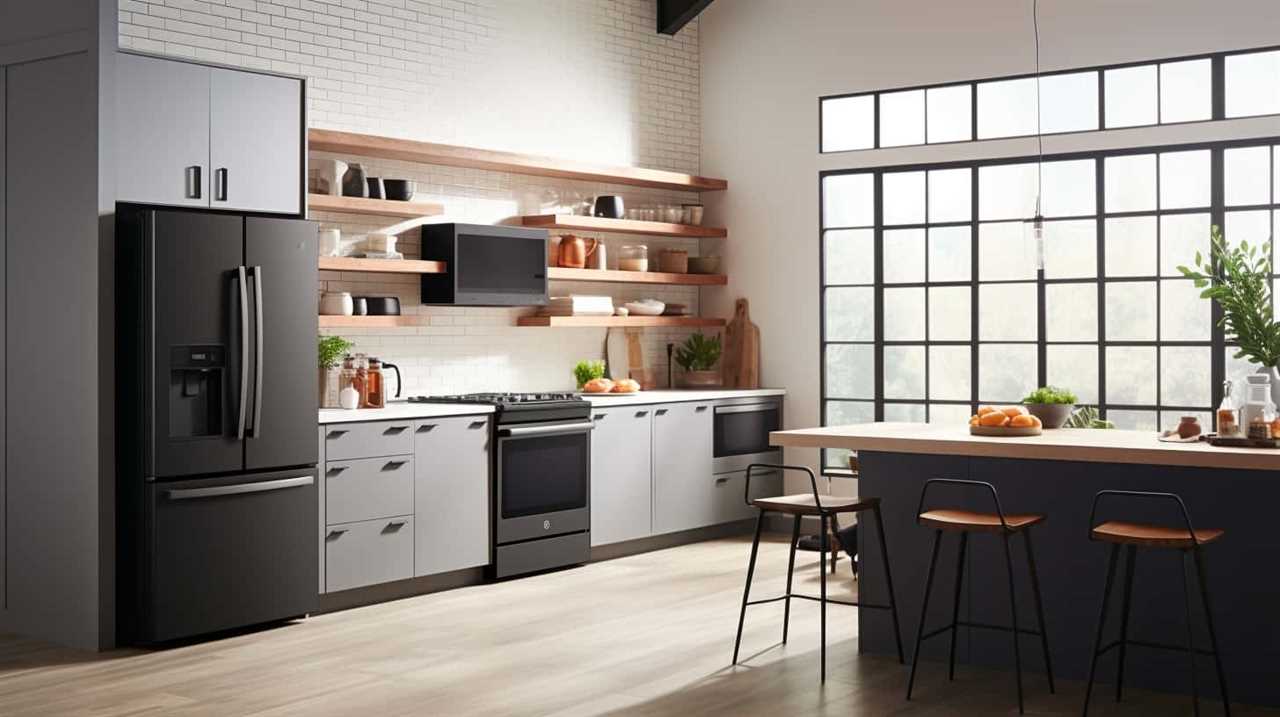
One effective way to address minor repairs is by having a troubleshooting guide readily available. This guide should include common issues that customers may encounter, along with step-by-step instructions on how to resolve them. By equipping ourselves with this knowledge, we can efficiently assist customers and address their concerns in a timely manner.
In addition to troubleshooting, addressing customer complaints promptly is crucial. Whenever a customer reports a problem, we should take immediate action to investigate and resolve the issue. This may involve scheduling a service call, ordering replacement parts, or providing instructions for self-repair. By doing so, we not only ensure customer satisfaction but also prevent minor issues from escalating into major problems.
Addressing minor repairs promptly sets the stage for the subsequent section on professional maintenance and tune-ups. These professional services go beyond addressing minor repairs and can help prevent future issues, ensuring the optimal performance and longevity of our kitchen appliances.
Professional Maintenance and Tune-ups
To ensure the optimal performance and longevity of our kitchen appliances, it’s essential to prioritize professional maintenance and tune-ups. Regular professional maintenance offers numerous benefits that contribute to the overall functionality and efficiency of our appliances.
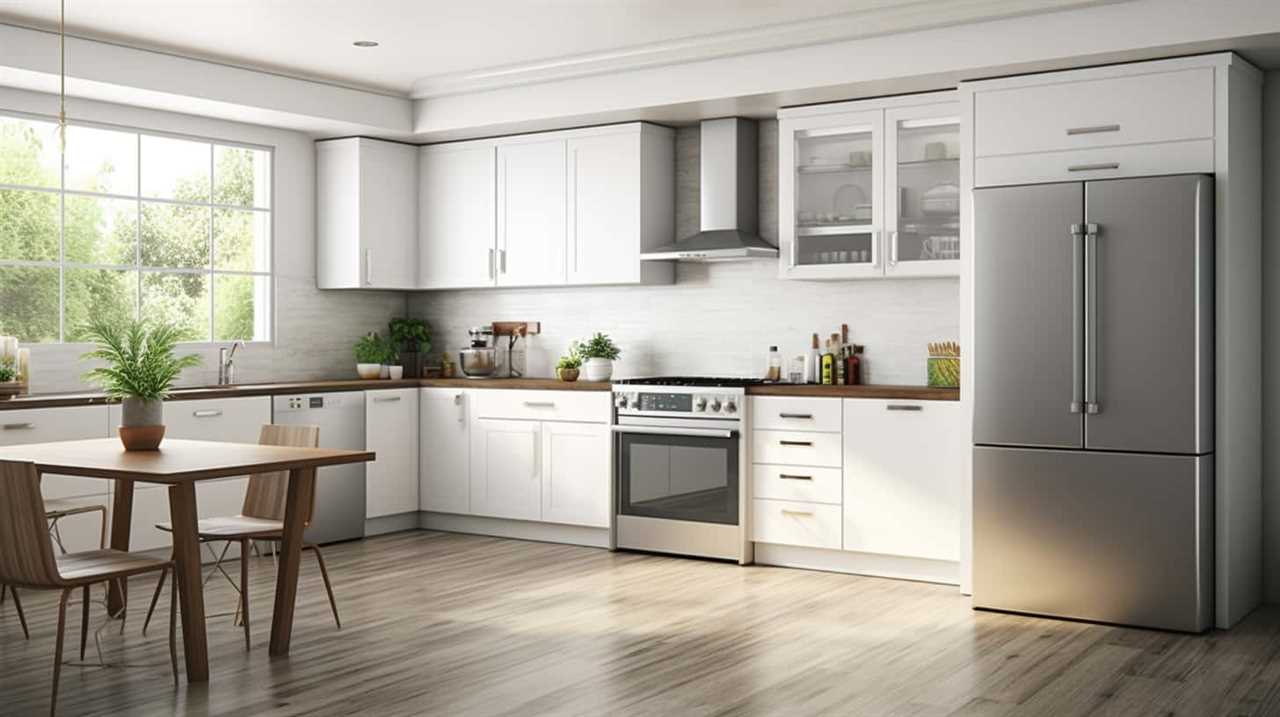
Here are some key advantages of investing in professional maintenance and tune-ups:
- Enhanced Performance: Professional maintenance ensures that our appliances are operating at their peak performance levels, resulting in improved functionality and efficiency. This helps to maximize the appliance’s lifespan and prevent potential breakdowns.
- Extended Lifespan: By regularly servicing our kitchen appliances, we can significantly extend their lifespan. Professional technicians can identify and address any underlying issues before they escalate into major problems, saving us from costly repairs or premature replacement.
- Energy Efficiency: Professional maintenance and tune-ups optimize the energy efficiency of our appliances. This means they consume less energy, reducing our utility bills and helping to conserve valuable resources.
Investing in professional maintenance and scheduling regular tune-ups for our kitchen appliances is a wise decision. Not only does it improve their performance and extend their lifespan, but it also enhances energy efficiency, leading to long-term cost savings. By prioritizing professional maintenance, we can ensure that our appliances continue to serve us reliably for years to come.
Frequently Asked Questions
How Often Should I Clean and Maintain My Kitchen Appliances?
Regular cleaning and maintenance of kitchen appliances is important to ensure their optimal performance and longevity.
We should clean and maintain our kitchen appliances frequently to prevent the buildup of dirt, grease, and food particles, which can affect their efficiency.
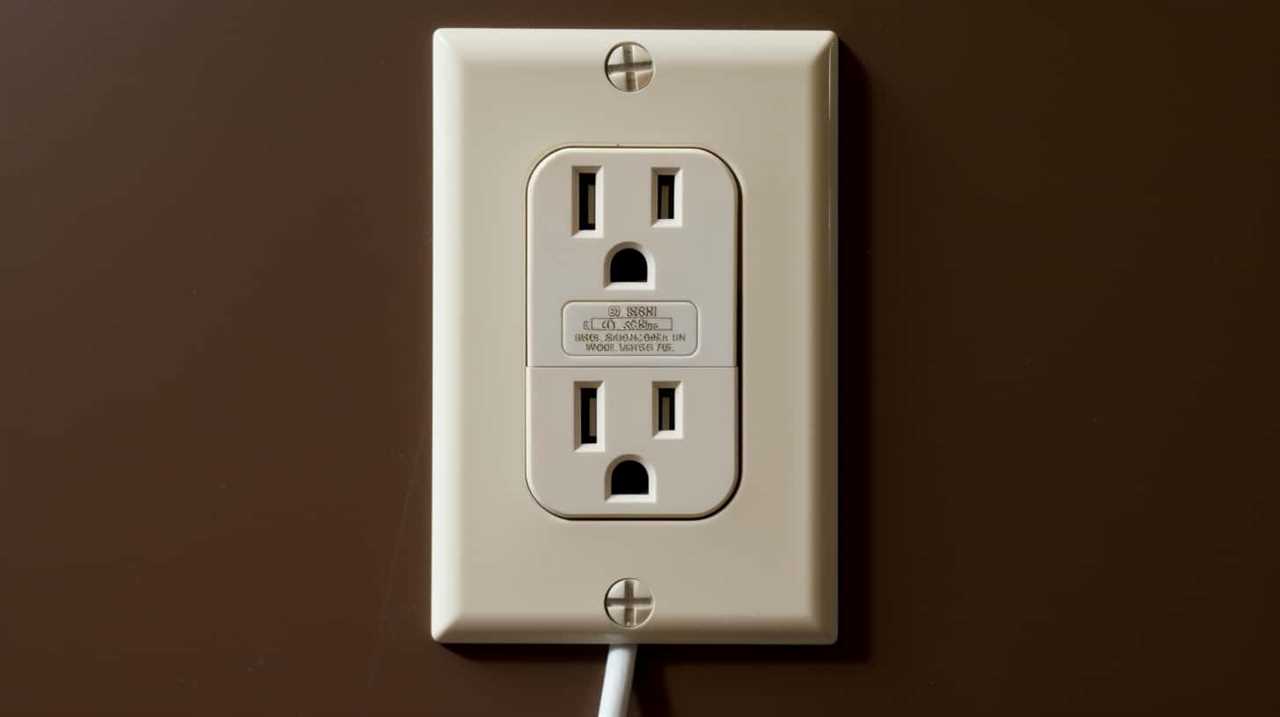
Common mistakes to avoid include using abrasive cleaners on delicate surfaces, neglecting to clean filters and vents, and not following manufacturer’s instructions.
What Are the Signs of Wear and Tear That I Should Be Looking For?
Signs of wear and tear are important to identify when it comes to kitchen appliances. These indicators can help us catch problems early and prevent further damage.
Some common signs include:
- Unusual noises
- Leaks
- Decreased performance
- Visible damage such as cracks or rust.
Regular inspection and maintenance can help us stay on top of these issues and extend the lifespan of our appliances. By addressing wear and tear promptly, we can avoid costly repairs and ensure our appliances continue to function at their best.

How Do I Properly Inspect the Electrical Components of My Kitchen Appliances?
When it comes to electrical safety and inspecting the electrical components of kitchen appliances, we follow specific troubleshooting techniques.
First, we ensure that all appliances are unplugged before inspecting any electrical parts.
Then, we carefully examine the power cords, plugs, and outlets for any signs of damage or wear and tear. We also check for loose connections or exposed wires.
Regularly inspecting these components helps prevent electrical accidents and ensures the proper functioning of the appliances.
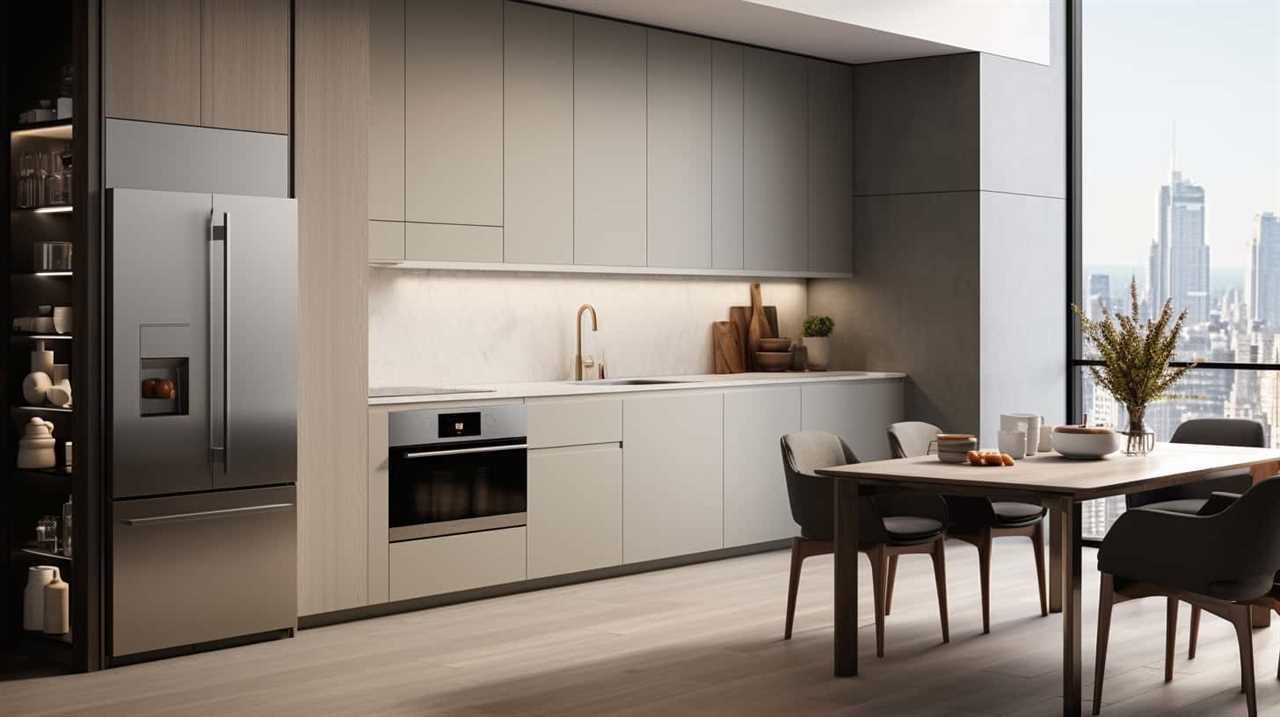
What Are Some Tips for Ensuring Proper Ventilation and Airflow in My Kitchen?
Proper maintenance of kitchen appliances can help ensure their longevity and functionality. One important aspect is ensuring proper ventilation and airflow in the kitchen. Here are some tips:
- Clean the exhaust fan regularly to prevent buildup of grease and dirt.
- Check and clean range hood filters to ensure proper airflow.
- Keep kitchen windows open for improved ventilation.
- Install a kitchen exhaust hood for better removal of fumes and odors.
- Avoid blocking vents and air ducts.
These measures create a healthier cooking environment.
How Often Should I Lubricate the Moving Parts of My Kitchen Appliances?
When it comes to maintaining kitchen appliances, knowing how often to lubricate their moving parts is crucial. Regular lubrication is essential for ensuring smooth operation and extending the lifespan of your appliances.
The frequency of lubrication depends on the specific appliance and its usage. Generally, it’s recommended to lubricate kitchen appliance moving parts every six months to a year.

Silicone-based lubricants are the best choice as they’re heat resistant and provide excellent lubrication without attracting dust or dirt.
Are the Preventive Maintenance Strategies for Kitchen Appliances the Same for Commercial Appliances?
When it comes to the importance of appliance maintenance, preventive strategies for kitchen appliances differ from commercial ones. Commercial appliances usually undergo heavier usage, requiring more frequent maintenance and professional servicing. Regular cleaning, inspections, and timely repairs are crucial for both types to ensure longevity and efficiency.
Conclusion
In conclusion, by following these effective preventive maintenance strategies for kitchen appliances, we can ensure their longevity and efficient performance.
Are you ready to take the necessary steps to protect your valuable kitchen appliances and avoid costly repairs?



